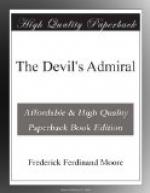“Ever handle steam-wheel?”
“Aye, sir. One trip out of Cardiff to Delaware Breakwater in the Skipton Castle. Stood wheel—”
“See the mate,” said Captain Riggs, and Petrak went out, deserting my baggage.
A black boy in a scarlet sarong took my bag away to my stateroom, but I went up to the hurricane-deck, where I found a grass-chair under an awning and sat down to enjoy a cigar.
Just above where the Kut Sang lay was the Bridge of Spain, presenting a moving panorama of the many races that mingle in the Philippine capital. The river itself was alive with cascoes being poled about by half-naked natives, the families of the crews doing the cooking and primitive housekeeping on the half-decks, while the family fighting-cocks strutted on the roofs of the boats and crowed defiance to each other.
On the opposite side of the river was the walled city and the moss-grown walls of Fort Santiago, and on both banks were steamers and river-craft, making a colourful and noisy scene.
The Rev. Luther Meeker was preaching to the group before the Sailors’ Home, and I watched him until he closed the service and started toward the dock, two men carrying his little street-organ behind him.
Mr. Harris, the mate, was doing the final work of getting the steamer ready to sail, and was preparing to cast off the lines, when a dray, loaded with boxes, pulled up alongside the vessel.
“What ye got there?” demanded Harris. “That ain’t for this packet—git out the way thar!”
Just then a man in white darted out of the office of the harbour-police station, and, holding up his hand, cried to Harris:
“One minute—one minute!”
“One minute yer grandmother!” retorted Harris angrily. “Who be you to hold up this ship! Vamose!” he roared to the driver of the dray.
The man in white ran up the gangplank with a paper in one hand and a malacca cane in the other, and I recognized him as Mr. Trego, the man to whom I had been introduced in the bank. He met Harris at the foot of the ladder to the hurricane-deck, and they were right below me, so I could not avoid hearing what took place between them.
“Call the captain, Mr. Mate,” said Trego hurriedly, and, with his voice lowered, “Here are my papers—get those boxes off the wagon, eef you please. I am supercargo for the owners. I hold the charter for these sheep. Queeck—on deck with those boxes of the machinery.”
“Oh, cap’n!” called Harris, after he had taken a quick glance at the paper which Trego thrust before him, and Captain Riggs came out of the saloon.
“What’s up now?” he demanded. “What’s this?”
Harris waved his hand toward the paper, and Trego put it before Captain Riggs.
“Read it,” said Trego. “Here are your orders from the company.” He leaned against his cane and twirled his moustache, while Captain Riggs adjusted his glasses and scanned the papers.




